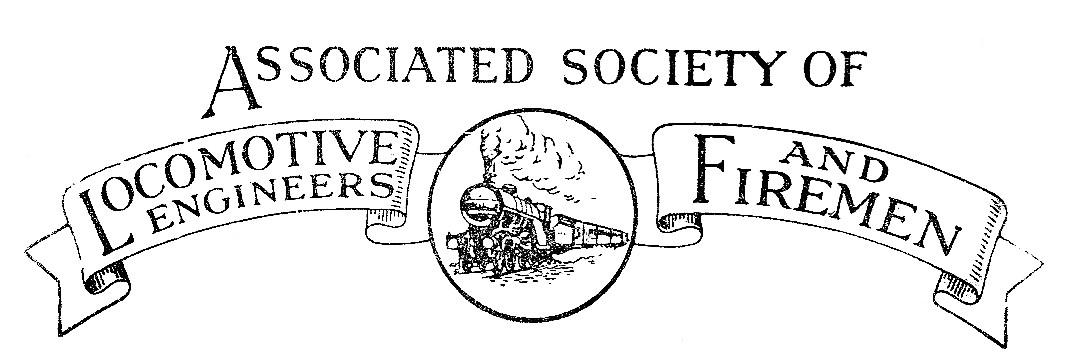
THIS WEBSITE, THE BRIGHTON BRANCH OF A.S.L.E.&F.
HAS NOW BEEN MOVED TO A NEW SITE CALLED
IGNITING THE FLAMING OF UNITY
http://ignitingtheflameofunity.yolasite.com/1950.php
PLEASE CLICK ON THE IMAGE BELOW TO TRANSFER TO THIS NEW SITE
CLICK ON THE ABOVE IMAGE TO TAKE YOU
TO THE NEW UPDATED COMBINED AND WEBSITE
IGNITING THE FLAME OF UNITY WEBSITE
THIS WEBSITE COMBINES THE FOLLOWING WEBSITES
THE BRIGHTON A.S.L.E.&F., THE BRIGHTON MOTIVE POWER DEPOTS
& THE SUSSEX MOTIVE POWER WEBSITES
WHICH EXPLAINS THE EVOLUTION OF THE FOOTPLATE GRADES AND THE HISTORY OF THEIR TRADE UNIONS AND THE STRUGGLES TO IMPROVE THEIR WORKING LIVES
THE 1950's
No. 1 BRANCH SECRETARIES
HARRY WARE 1955 - 1959
(Footplate Seniority, no date available)
No. 2 BRANCH SECRETARY
& C. STONER 1951 - 1964
(Footplate Seniority 01.12.1916)
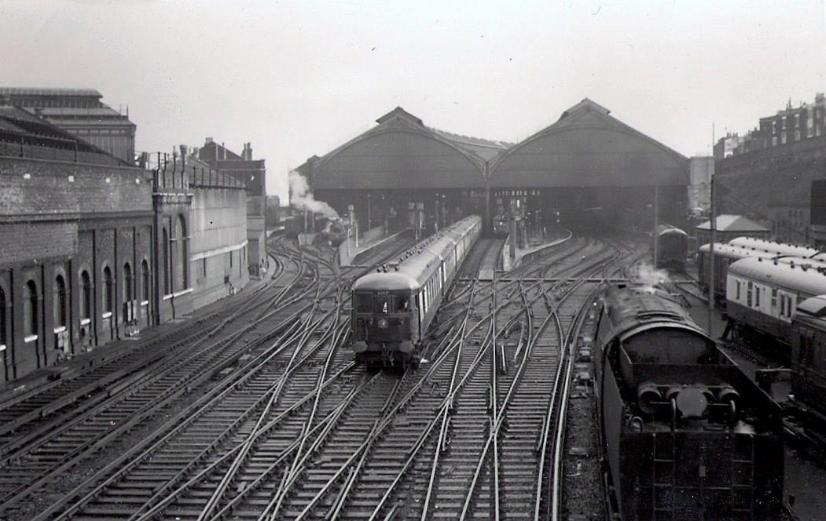
LOCOMOTIVE JOURNAL
MARCH 1950
Page 42
BRIGHTON (2)
It is very pleasing to note the attendance at branch meetings is increasing; it shows that some interest is now being taken in the
branch and the work of the Society. Come and air your views at the meetings - 1st and 2nd Thursdays in each month - one for
each shift. Help to send in resolutions for Housing and Pensions.
I hope all members read the February journal, especially those who do not pay or have contracted out from paying the
Political Levy.
Now we have a new committee and we are also hoping to have our own L.D.C. it is now up to you to get things moving;
everyone will be welcome.
C.A. BACHELOR
BRANCH SECRETARY
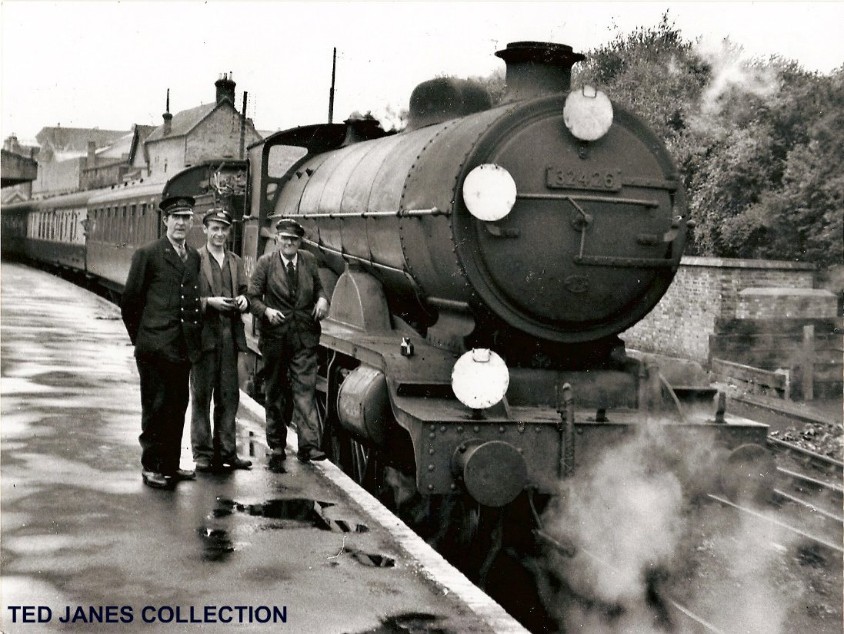
Driver Bob Roser, Fireman Ted Janes & Unknown Brighton Guard
This photo was taken by Fred Rich at Bournemouth West on the 15th August 1952
with 13:52 Bournemouth West to Brighton
The engnie was a Brighton Atlantic Class H2, 32426 'St. Albans Head'
Ted Janes recalls firing to Arthur Robert Roser for about two years in the 'Top Gang' and he was
possibly Ted's longest mate and was apleasure to fire to.
Bob at the time of this photo being taken would of been about 59 years old and Ted was 24.
Bob entered the footplate grades at Brighton on the 25.06.1910.
LOCOMOTIVE JOURNAL
FEBRUARY 1954
Page 54
A.R. NEWBEGIN
ORGANISING SECRETARY
A further visit to Brighton has been necessary as a result of management wanting to introduce a new Summer Roster at
Brighton and West Worthing depots which is unacceptable to the men. If the L.D.C. are allowed to function as the machinery
intends. I am satisfied that a solution to the vexed problem of excessive Sunday work can be found.
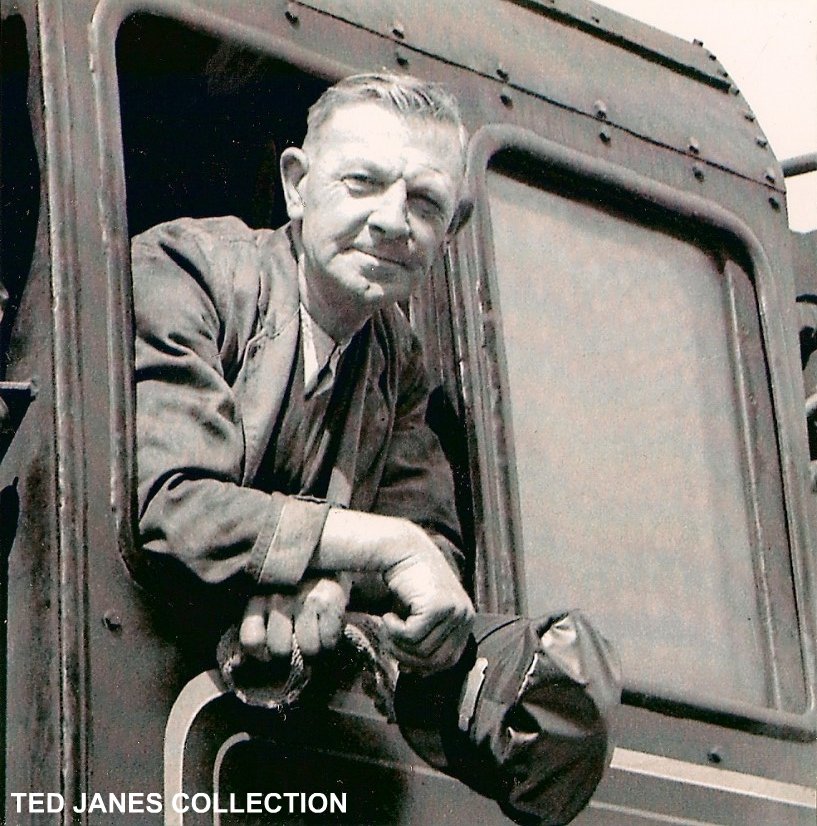
Driver George Frederick Laycock on a West Country 34045 "Ottery St. Mary" 4th July 1952
George was approach his 62nd birthday which was on the 23rd July.
George entered the footplate grades on the 11.06.1909.
Ted Janes recalls: George Laycock was one of my favourite drivers out of the 11 regular mates
during his firing career. I fired to George in 1949-1950 in the next to top link, without doubt the
happiest two years of my firing career. He had the nickname of John Bull and a couple of his
previous mates didn't get on too well with him but we got on well together and would frequently
have a drink and game of snooker even though we had done a days work together
I can recall that all his drivers were very nice blokes and it was a pleasure to be at work with
them all. However George really stands out from the rest.
Ted fired to George in the "Second Gang" which at time was mostly made up of work which the
"Top Gang" did not want, so the "Second Gang" had a variety of work which included a trip up
the "Cuckoo" from Polegate to the Wells along with the 03:25 paper train.
He had a wicked side and Tunbridge Wells was his happy hunting ground for winding people up
more often than not about their short shunts to London and what they were missing by not
having West Country's to work on.
LOCOMOTIVE JOURNAL
FEBRUARY 1954
Page 58
BRIGHTON (2)
We have he’d the pleasure of recent visits by Bros. P.G. Hocking and E. Cordell. It was evident by the attention given and the
able way in which questions were answered, coupled with helpful advice rendered by both E.C. Members, that those listening
left the meeting fully satisfied that the past two hours had not been wasted.
Bro. Newbegin also attending at a meeting of L.D.C. representatives re duty bookings that are considered unsatisfactory, in
consequence of which joint inquiry has been asked for.
The retirement and social fund committee once again arranged on November 21st a very enjoyable evening at Labour Club,
when presentations were made to retiring Bros. J. Pearce, C. Parker and T. Parsons. gifts were handed to these Brothers by
Bro. W. Bolton (Selhurst), and his words to each were suitably replied to by the members concerned. Bro. Richard should also
have received his retirement gift but illness of his wife prevented his being present. Excellent entertainment was provided by
the “The Revelaires” Concert Party, for which our grateful thanks are due.
May I remind members of this society that those in and around the Brighton are may join this fund on application to Branch
Secretary, Bro. C. Stoner.
F.W. MUSK
BRANCH CHAIRMAN
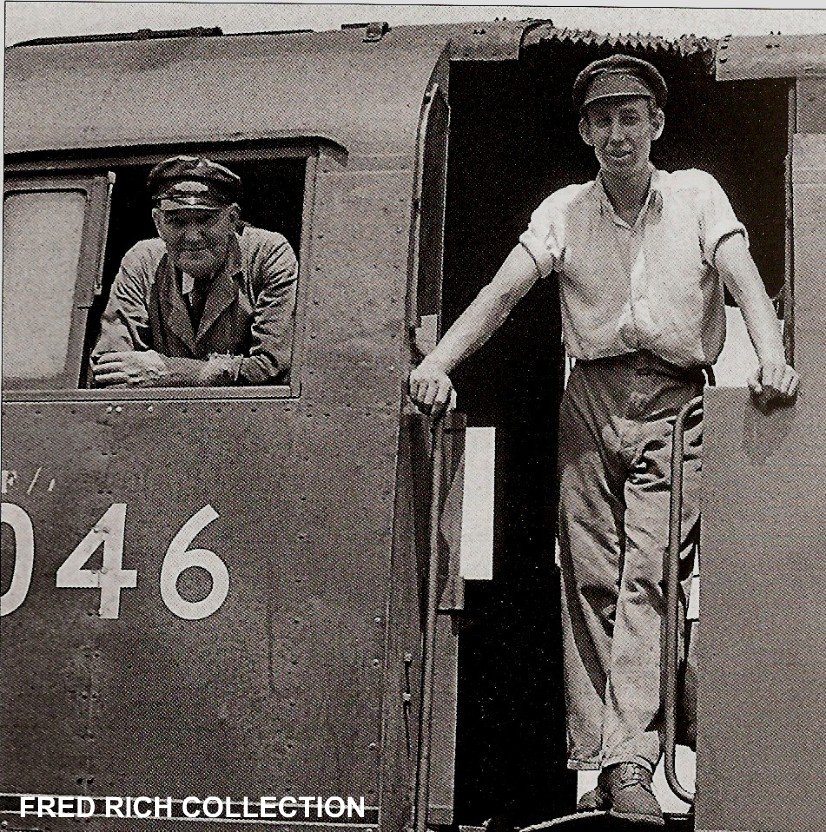
Driver Bob Roser & Fireman Reg Craft 12th July 1955.
The small extract below recalls part of his trip on the eleven o’clock Brighton to Cardiff on Monday 11th July 1955. Brighton
men used to work this train as far as Salisbury. The Brighton fireman on this trip was Reg Craft, who showed how he would
cope with the firing whilst working up Dean bank. It also records the feelings of Brighton engine-men’s towards their fellow
South Western Enginemen.
An extract from the Fred Rich Journals
We had no booked stops over the 24.5 miles between Southampton and Salisbury; and from Nursling [4.5 miles beyond
Southampton] we began the 16 mile climb up to Bridge 44. At this point Reg initiated me into a bit of nonsense which, for him,
was utterly out of character. He (along with many others from 75A) feels that most “South-Western” enginemen think too
much of themselves and their railway. At Dean [about 4.75 miles from Bridge 44] the ‘eleven o’clock Cardiff’ always passes a
goods engine in the sidings, with Salisbury men in charge of it; and Reg likes to show ‘em what he thinks of their Dean bank.
The game is to have a ‘a potful of water’ and a full head of steam after passing through Romsey. This produces (for the benefit
of those Salisbury men) the spectacle of a Brighton ‘West Country’, trailing 10 corridors, hurtling up through Dean with
safety valves blowing and with the fireman relaxing in his seat, smoking a cigarette and preferably reading a newspaper.
Fred Rich worked as an engineering apprentice at Brighton Locomotive Works and commuted from Tunbridge Wells. Fred
became known to a number of engine-men at Brighton. On his days off Fred would see if he could get a cab ride with the
various engine-men that he knew and spent most of the trips doing some of the firing.
LOCOMOTIVE JOURNAL
STRIKE ISSUE
DISPUTE AND VICTORY
This special issue of the" Journal," covering the months of July/August, commemorates a truly historic passage in the annals
of the A.S.L.E. & F.-namely, the great stoppage of labour by the locomen of Britain, lasting for 17 days from midnight on
Saturday, May 28th, 1955; a stoppage which, in spite of opposition by the Government, the Transport Commission, the Press
and the N.U.R., resulted in a telling victory for our cause. Such a result was achieved as the direct outcome of the magnificent
solidarity shown throughout by our fraternity-not forgetting the wonderful support given by so many N.U.R. loco. members
who, with us, appreciated the great and lasting importance of the principle at stake.
We would also join in the tribute paid by the E.C. to the untiring and highly efficient work performed in organisation, etc.7 by
district and local strike committees throughout the country, whose selfless efforts, enthusiasm and service abundantly showed
that the spirit which animated the pioneers and the men of 1924 still remains vital and strong as ever inour Society to-day.
The strike will go down on record as the greatest example of Trade Union loyalty for many years. It is significant that its result
has been universally hailed by other craft unions as a victory for a principle fundamental to any logical, just or durable wage
structure----the principle of "differentials," which means the due reflection, in the pay packet, of extra responsibility and skill.
Details of the terms of settlement, together with further observations and records of fact, will be found in this issue.
Mean time we here set down our sincere expression of gratitude, admiration and thanks for the grand loyalty and solid support
so unstintingly given by Loco. staff and Motormen to the policy of the only Society which reflects their aspirations and
desires-the A.S.L.E. & F.
We also record our deep thanks and appreciation to the T .U.C. for the constructive part which they played throughout, with a
view to bringing about a satisfactory settlement; and also to the many trade union organisations at national, district and local
level which sent good wishes for our success,and so readily proffered. their assistance both financially and in other ways.
Our heartfelt recognition and thanks are particularly expressed to our colleagues of the Transport Salaried Staffs' Association
for their consistent support rendered in every way.
THE DISPUTE
Some Facts and Observations
In looking back upon our recent dispute and assessing its results it will be helpful first of all to glance at the gradual
development of the situation which finally came to a head in April and May last.
Readers will well recall how in December, 1953, following rejection of the 4s. flat-rote increase awarded in Decision No. 15
of the Railway Staff National Tribunal, a dispute arose between the railway Trade Unions and the Transport Commission. The
terms of settlement of that dispute included the following clause (No.2):
" 2. The British Transport Commission are prepared to examine with the trade unions their whole wage and salary structure.
The British Transport Commission contemplate that this examination would be completely exhaustive without conditions of
any kind. Its purposes would be
To correct anomalies and give added incentives including differentials in desirable cases;
and to investigate all standard rates of pay.”
We were, however, doomed to disappointment. Aftereight months of fruitless negotiation on Clause 2, we broke off direct
discussions and took the matter forward throughthe Machinery to the Railway Staff National Tribunal. Although the B.T.C.
raised no procedural objection to our doing this, such an objection was in fact put forward by the N.U.R. This tended for a
time to delay progress but the tactic was soon outmanoeuvred. The result of our reference to the Machinery was Decision No.
16 of the Tribunal in November of last year.
DECISION No. 16 - SUBSTANTIAL BENEFITS
That decision pin-pointed the Society's case for differentials. True, it did not give to locomen everything for which we asked
on their behalf. Nevertheless (as the Executive Committee recognised in accepting it) Decision No. 16 did in fact concede
substantial advances to our grades, e.g.;-
Driver,
1st year 13/-
2nd year 20/-
3rd year 26/-
4th year 22/6
5th year 19/-
6th year 14/-
Fireman,
1st year 5/-
2nd year 13/-
3rd year 19/6
4th year 16/-
5th 11/-
6th year 7/-
Engine Cleaner (after 1st year) 4/6
(In addition, the incremental period between the minimum and maximum rates for Driver and Fireman respectively were
halved, i.e. reduced from six years to three years in each case. Further, the differential for the Cleaner, over and above the
adult minimum rate, was again reintroduced.)
Within a matter of days or the Tribunal hearing, the N.U.R.had repudiated their settlement in respect of other conciliation
grades, reached as recently as 8th October (the previous month). It is well to remember that at the said hearing the rates of pay
of all these grades embodied in this settlement had been placed before the Tribunal by the B.T.C., no doubt to ensure that they
had the whole picture in front of them.
As is well known the Minister of Labour set up a Court of Inquiry following which direct negotiations between the N.U.R.
and the B.T.C. resulted in their agreement of January last, which broadly conceded the 15 per cent originally sought in 1953.
Here it must be borne in mind that at the time of these negotiations the position of the Society in regard to relativity,
differentials and R.S.N.T. Decision No. 16, was made crystal-clear to the B.T.C., as also it had been fully ex- plained by the
General Secretary in a statement before the Court of Inquiry.
DECISION No. 17
Thus the January agreement for other conciliation grades distorted yet again the relative rates of the locomotive grades. This
position was in fact recognised by the B.T.C.. who entered into discussions with us regarding necessary adjustments.
Nevertheless, these discussions proved abortive because of the unsatisfactory nature of the maximum offer forthcoming from
the RT.C., ranging from 6s. 6d.weekJy for the adult Cleaner to 2s. 6d. per week for the Driver on the top rate. (A point of
interest here is that the 2s. 6d. in respect of the Driver's maximum was obviously acceptable by the N.U.R. because it was in
fact the figure claimed by them.)
The A.S.L.E. & F. again had recourse to the Machinery. resulting in R.S.N.T. Decision No. 17, which confirmed the RT.C.
offer just mentioned. That decision therefore was in serious contradiction of the differential position estab-lished by the
previous award (No. 16) of November, 1954. We accordingly had no alternative but to reject it and givenotice (on 15th April)
of our intention to strike as from1st May.
It is quite significant that despite the emphasis on differentials in the 1953 agreement the N.U.R. consistently maintained their
policy on a broad 15 per cent basis. It was also ominous that the B.T.C. offer followed the same pattern, despite their so recent
acceptance of Decision :No. 16. We could not allow the wages of footplate staff to be so determined.
THE APRIL FORMULA
However, in the intervening period, as a result of mediatory efforts by the T.U.C., discussions with the Commission took place
and produced the following formula, as a result of which our members were instructed to remain at work and negotiations
were reopened:-
"(1) The British Transport Commission confirm their acceptance of Award No. 17 of the Railway Staff National Tribunal of
April, 1955, and will implement it forthwith as the final resolution of the negotiations arising from the Agreement of
December, 1953. This position is accepted without prejudice by the A.S.L.E. & F. subject to paragraph (2); they will therefore
instruct their members to continue at work.
(2) The Commission will consider forthwith any proposals which the Society desire to put to them onthe question of
differentials with a view to discussions proceeding with all the parties concerned. Whilst the Commission cannot enter into
any prior commitments, every endeavour will be made to reach agreement. It is the intention that such discussions should be
concluded at the earliest possible date.
(3) The Commission agree that neither of the recent Awards of the Railway Staff National Tribunal willbe regarded as
establishing principles which will pre- clude free and immediate discussion of any proposals which may be submitted."
The rates of pay which thus became operative for Our grades as from 10th January, 1955, were as follows:-
Adult Engine Cleaner Per Week
1st year 133/-
2nd year 135/-
Engine Cleaner (after the prescribed number of firing turns have been worked representing one year) 145/-
Fireman and Assistant Motorman
1st year 145/-
2nd year 154/-
3rd year 164/- (Max.)
Fireman (after the prescribed number of firing turns have been worked representing one year) 175/-
Driver and Motorman:
1st year 175/-
2nd year 185/-
3rd year 195/- (Max.)
Shed Chargeman, Category “A” 175/-
Shed Engineman 175/-
Shed Engineman’s Mate 145/-
(A London rate of 3s. higher than the provincial rate to be applied to Engine Cleaners employed in London.)
The instruction to our members to remain at work was given because the agreed formula recognised Society policy on
differentials and seemed to afford reasonable justification for the hope that progress could be made along these lines;moreover,
our legal right to strike if necessary remained fully protected.
We immediately re-submitted to the B.T.C. the claim in dispute; this course was logical, honourable and proper because the
said claim sought to maintain the differential position set up by Decision No. 16. The N.U.R. madeno proposals affecting
footplate staff at any time during the succeeding discussions. What they did do was to seek to broaden the issue into one of
differentials for .. all railwaymen." No progress whatever could be registered due to the attitude of the Commission, who were
only prepared to look at (a) a reintroduction of the utterly obnoxious principle of classification of enginemen; and (b)
improvements in mileage payments. Strongly pressed by us to give consideration to our claim for restoration of differentials,
they declined to do so, their spokesman stating that our claim could not be conceded either in whole or in part:’
THE STRIKE TAKES PLACE
In these circumstances the Executive Committee were obviously left with no alternative but to reimpose the strike notice, and
this duly took effect as from 28th May. We were immediately accused in various quarters of"dealing a blow at the sanctity of
negotiating machinery," and of" undermining the principles of collective bargaining." Yet our patient, consistent adherence to
constitutional procedure had been a matter of common knowledge throughout the long course of the negotiations, and our
action in calling a strike when we did was entirely in conformity with procedure laid down in the Machinery of Negotiation
itself.
WHOSE RESPONSIBILITY?
The responsibility for the emergence of a strike situation was not ours. We had sought the due honouring of Clause 2 of the
settlement of December, 1953, and of a position in respect to differentials already created by the Railway Staff National
Tribunal. The Transport Commission must take the blame for their failure to face up to the justice of our claim; and here it
must be added that their opposition was seriously aggravated by the attitude of the N.U.R.-an attitude dictated purely by
opportunist considerations, and with no element of loyalty to the principle of differentials, although that principle had been the
true point at issue throughout the whole of the wage negotiations of 1954-55.
Indeed, it cannot be too often emphasised that the N.U.R.bad sought in fact to ha,,"e the reference to differentials omitted from
the December, 1955, settlement; and, incidentally that also bad it not been for the initiative of the A.S.L.E. & F" not only the
wage rates of locomen, but like wise those of all conciliation grades would have been substantially lower to-day than in fact is
the case.
The Railway Staff National Tribunal must also take its share of the responsibility. and if there is anything at all which" deals a
blow at the sanctity of negotiating machinery," then it is such decisions as R.S.N.T. Decision No. 17, given in face of
differentials set up by the same Tribunal only five months previously: differentials, not only in connection with the adult
minimum rate, but related to the grades within the Line of Promotion itself.
The strike issue was perfectly straightforward. It was NOT a question of a wage application as such, but simply one of
maintaining, as we have indicated, the operation of the vital principle of differentials established under Decision No. 16.
A MAGNIFICENT RESPONSE
The response to the strike call was immediate and overwhelming, confounding all who anticipated otherwise. Moreover, it
was maintained 100 per cent throughout the whole seventeen days of this, the longest strike in railway history.
That response, coming as it did from many colleagues in the N.U.R., in addition to the Society's membership, clearly showed
that our fraternity were alive to the all-important nature of the issues involved. The scope of those issues were in fact quickly
widened following the broadcast by the Prime Minister on the first day of the strike; it appeared that the Government were in
support of the attitude which the B.T.C. were seeking to maintain, that negotiations" could not" proceed" under duress." Thus,
in its early hours our struggle raised considerations vitally affecting the rights, not only of organised craftsmen but of every
Trade Unionist throughout the land.
Looking back upon the strike it can be seen that in the first nine days (remembering that in 1924 the strike did not last this
long) there was no attempt on the part of the Commission or the Government to bring about a settlement. Tt was fully
apparent that the solidarity of our people was being tested. It seemed that regardless of the cost to the country or the industry,
here was a determined attempt to break the strike. How triumphantly that test was undergone is not only a matter of history,
but will remain as the Society's finest hour wherein the opposition was completely routed.
The influence of the T.U.C. undoubtedly caused a change of attitude by the opposition. As a result of several meetings with
the T.U.C. representatives, a period of intensive negotiation commenced under the aegis of the Ministry of Labour. Progress
was slow: Eventually, as a result of the determined stand made, the B.T.C. were prepared to throw over their attempt to
reintroduce classification, but insisted that cash increases could not be discussed unless the strike was called off.
On the latter issue deadlock prevailed for a considerabletime until, faced with the fact of the continuing solidarity of our
grades, the Commission's representatives at lastconceded that there should be a cash increase in the basic rates of Drivers and
Motormen. As to the amount of the increase, it was proposed that this question should be remitted to a referee of unquestioned
integrity who would immediately hear the parties and give his verdict thereon.Such verdict would be accepted by both sides
and the strike would then be called off.
TERMS OF SETTLEMENT
We strongly pressed the Firemen's position, and ultimately secured agreement that the maximum rate for that grade should
also be submitted to the referee, but without commitment on the part of the B.T.C.
The importance of these developments will be readily apparent. The Commission had now abandoned theirimpossible attitude
of "no concession while the strike ison"; they had agreed that all Drivers and Motormen,
particularly those on the top rate, should have an increase; and the position of the top-rated Fireman was also to bedealt with
by the referee. Moreover, the effort of the B.T.Cto bring back classification had successfully been rendered abortive.
For some days the N.U .R. had been insisting that the time bad arrived for joint discussions, despite the fact that from the
same quarter the strike had been criticised. We insisted, however, that the dispute lay between this Society and the B.T.C., and
that any settlement could only be agreed between the same parties.
Accordingly, having obtained satisfaction on the vital principle, on 14th June we voluntarily lifted the strike, thefollowing
being the formal terms of settlement:-
The following is agreed as a liJasisfor the subsequent settlement of matters now in dispute between the BritishTransport
Commission and the Associated Society of Locomotive Engineers and Firemen:-
1. Within seven days of the cancellation of the strike and resumption of work the Commission will negotiate with both Unions
representing Footplate Staff on the basis given hereunder.
2. The Commission accept the principle that there should be higher rewards for special skill and responsibility where not
already given and they agree that there is a case for such higher rewards for certain sections of the Footplate Staff.
3. In previous discussions on this question the Com-mission put forward proposals to deal with it by- (a) special allowances to
Drivers and Motormen for driving certain types of trains;
(b) an extension, on a basis which they defined. of the mileage payment system already in operation.
4. Having been advised at this time that their proposal under para. 3(a) above is not acceptable, the Commission agree not to
press it as part of the projected settlement although they adhere to the view that it would be of benefit to the industry.
5. The Commission have represented that considerable benefits would accrue, to both Drivers and Motor-men and to Firemen
from their proposal under para. 3(b) abov'e. They have stated their readinessLoconsider at this time modifications of the par-
ticular proposal which they had presented. The A.S.L.E. & F. agree that an extension of mileage payments, either on the basis
of the Commission's proposals or an improvement thereof, shall be accepted as part of the higher rewards referred to in para. 2
above.
6. (a) Having withdrawn their proposal under paragraph 3(a) above the Commission have stated their readiness to examine
instead basic wages in the driver grade, particularly in respect of the highest rated Drivers and Motormen.
(b) The A.S.l.E. & F. having requested a more definite statement of the Commission's intentions under para. 6(a) above than
they were prepared to give, it has been agreed to ask the Minister of Labour to appoint a Referee of impartiality, integrity of
Labour and acknowledged judgment to name the figures which he considers appropriate as basic wages in the driver and
motorman grades as a settlement of para. 6(a) above after bearing the views of the parties privatelyand separately. It is agreed
that the N.U.R. shall be entitled to be heard by the Referee.
(c) The A.S.L.E. & F. will present to the Referee for his decision their views about the appropriate rate to be paid to the ,third-
year firemen, as presented by them to the Commission. The Commission have stated that they will not raise objection to the
Society presenting their views in this way, but reserve in such case their own right to present their views.
(d) When the Referee mentioned in paragraph 6 above gives his"decisions they shall be accepted immediately and without
question by all parties.
7. As regards any corresponding application of the principle mentioned in para. 2 above to other than Footplate staffs which
the Commission may negotiate separately with the Union or Unions concerned, the Commission will not, on this account,
delay acceptance of a settlement for the Footplate staff which they are prepared to accept on its own merits.
8. It is agreed that when a settlement has been reachedunder para. I above, the corresponding application of the principle
mentioned in para. 2 above to other than Footplate staffs shall not be held to justify a further upward revision of the settlement
for Footplate staff.
9. In view of the foregoing, in the best interests of allconcerned, the A.S.L.E. & F. decide to cancel thestrike forthwith. It is
agreed that there shall be no victimisation of any kind.”
THE MORRIS AWARD
The Minister of Labour appointed Lord Justice Morris as the Referee under Clause 6 of the settlement. At three meetings with
the Lord Justice we spared no effort in presenting the best possible case on behalf of our member grades. In the course of
these meetings we formed the opinion that the Referee for his part was anxious to have the fullest information so as to assist
him in reaching what he would consider a fair, just and honourable decision.
For record purposes the full terms of the Morris Award are set out on another page of this issue.
A CRAFTSMAN'S VICTORY
The Morris Award established a more reasonable measure of differentials for Drivers and Motormen, and it should be noted
that it is estimated that 96 per cent of Drivers andMotormen are on the maximum rate of pay and thus qualify for the further
increase at the rate of 3s. per week(the increases for the first-year and second-year men being1s. per week and 2s. per week
respectively). The award in fact maintained the fundamental principle of relativity for which we took strike action, and has
been universally and rightly, hailed as a CRAFTSMAN'S VICTORY.
REVISED MILEAGE ARRANGEMENTS
We had obtained a guarantee that the mileage proposals under Clause 3(b) of the strike settlement be improved and the
negotiations would be speedily and satisfactorily concluded. The agreement reached produces substantial cash benefits well in
advance of the cash differences involved in the dispute for a large proportion of footplatemen.
Tho new arrangements in this connection are also set out in this issue of the JOURNAL and a comparison with what the
B.T.C. originally offered (as notified to our branches by RO. circular) will readily reveal the great value to our fraternity of the
amendments now secured.It is noteworthy that the amounts obtained in respect of an elven day fortnight for Drivers and
Motormen and for Firemen and Assistant Motormen respectively are as shown on next page.
NUMBER OF MILES PAYMENT FOR 11 DAY FORTNIGHT
DRIVER AND FIREMAN AND
MOTORMAN ASSISTANT MOTORMAN
70 or more but less than 80 2/9 2/3 1/2
80 or more but less than 90 5/6 4/7
90 or more but less than 100 8/3 6/10 1/2
100 or more but less than 110 11/- 9/2
110 or more but less than 120 13/9 11/5 1/2
120 or more but less than 130 16/6 13/9
130 or more but less than 140 19/3 16/0 1/2
So far as concerns the position under section (ii of the amended proposals it will be appreciated that mileage payments will
now be made in respect of all mileage, including 140. In other words no odd miles will be dropped from the calculations; for
example, 140 - 144 miles, for which no payment has hitherto been made, will qualify for an-hour's payment-and likewise
whereas only half-an-hour has hitherto been paid for miles 148, 149 and 150, the payment will now be one hour and so on
throughout all greater mileage turns.
In effect, this section of the arrangements, translated into terms of cash, benefits the Driver on the top rate to the extent of £1
4s. 9d. over an S8-hours fortnight, and theFireman on top rate by £1 Os. 6d. for a similar period.
Furthermore, the value of clause (ii) paragraph 3 of the new arrangements will also not be overlooked, ensuring as it does that
any mileage man qualifying under this clause is treated similarly to a " time" man working upwards of miles.
THE E.C. TO THE MEMBERS
To conclude this examination of the dispute and its results, we cannot do better than quote from the concluding paragraphs of
a circular issued to branches on 1st July, wherein the Executive Committee, in expressing their appreciation of the great
loyalty shown, call upon each and all of us for renewed vigilance and activity in the period that lies ahead;-
"TAKEN TOGETHER THE RESULTS OF THE STRONG ACfION BY OUR SOCIETY AND FRATERNITY
CONSTITUTE A NOTABLE VICTORY AND A LANDMARK OF PROGRESS IN UPHOLDING AND
PROMOTING THE INTERESTS OF LOCOMOTIVE STAFF AND MOTORMEN, WHOSE DETERMINED
STAND HAS COMPELLED RESPECT FOR THEM SPECIAL STATUS, AND FOR THE A.S.L.E. & F AS ONE
ORGANISATION WHICH CAN EFFECTIVELY REPRESENT OUR CALLING.
In again acknowledging with pride the splendid solidarity which made these successes possible we would pay tribute also to
the work of organisation, etc., so magnificently performed by the various strike committees both at local and district levels,
and by so many of our active stalwarts, throughout the Regions of British Railways.
FINALLY, IN LOOKING TO THE FUTURE WE ARE CONFIDENT THAT OUR MEMBERS WILL SEE TO IT
THAT ALL NECESSARY STEPS ARE TAKEN TO ENSURE CONTINUED PROGRESS BY STILL FURTHER
UPBUILDING OUR CRAIT SOLIDARITY "UIDN THE A.S.L.E. & F :’
MILEAGE PAYMENTS TO FOOTPLATE STAFF
Revised Arrangements
With effect from 3rd July, 1955 (i.e. in respect of all turns of duty commencing after midnight on Saturday, 2nd July, 1955)
mileage payments to Drivers, Motormen, Firemen and Assistant Motormen are to he on the following basis:-
(1) For turns of duty involving mileage of 70 miles or more during any turn but 0/ less than 140 miles.
Payment to be made, additional to all existing payments and allowances in respect of the time worked, on the basis of:-
Drivers and Motormen
3d. for every 10 miles or part thereof.
Firemen and Assistant Motormen
2 1/2 d. for every 10 miles or part thereof.
The payments under this arrangement to be as follows:-
NUMBER OF MILES PAYMENT FOR 11 DAY FORTNIGHT
DRIVER AND FIREMAN AND
MOTORMAN ASSISTANT MOTORMAN
70 or more but less than 80 3d 2 1/2d
80 or more but less than 90 6d 5d
90 or more but less than 100 9d 7 1/2d
100 or more but less than 110 1/- 10d
110 or more but less than 120 1/3 1/0 1/2
120 or more but less than 130 1/6 1/3
130 or more but less than 140 1/9 1/5 1/2
(ii) For turns of duty involving mileage of 140 miles or during any turn.
Payment for mileage in excess of 140 during any turn is to be at the rate of one hour's pay for every 15 miles, in accordance
with the provisions of the existing agreements relating to mileage payments for Footplate Staff, but subject to the following
conditions :-
1. The mileage allowances for turns of duty involving 140 miles and up to 155 miles to be as follows:-
140 miles or more and up to 147 miles-half and hour. 148 miles or more and up to 155 miles-one hour.
2. Thereafter, odd miles are to be dealt with as follows:-
Distances of up to 7 miles-half and hour. Distances of 8 miles and up to 15 miles-one hour.
3. Staff working turns of duty of 140 miles or more who, under the existing arrangements are paid on the basis of time worked
instead of mileage arc to be paid in addition to the appropriate payments for the time worked a mileage allowance of:-
Drivers and Motormen-1s. 9d. Firemen and Assistant Motormen - 1s. 5 1/2d.
THE MORRIS AWARD
To The Right Honourable The Minister of Labour and National Service
SIR,
I was appointed by you on the 14th June, 1955, as the Referee to act in pursuance of the Agreement made on that date being
an Agreement made as a basis for the subsequent settlement of matters then in dispute between the British Transport
Commission and the Associated Society of Locomotive Engineers and Firemen.
2. I have heard the views of the Associated Society of Locomotive Engineers and Firemen, of the British Transport
Commission, and of the National Union of Railwaymen privately and separately.
3. With reference to paragraph 6(b) of the Agreement, I name the figures which I consider appropriate as basic wages in the
driver and motormen grade as a settlement of paragraph 6(a) of the Agreement as follows:-
Driver and Motormen
First year 176s. (One hundred and seventy-six shillings)
Second year 187s. (One hundred and eighty-seven shillings)
Third year (maximum) 198s. (One hundred and ninety-eight shillings).
4. With reference to paragraph 6(c) of the' Agreement, my decision is that the appropriate rate to be paid to the third-year
Firemen is as follows:-
Firemen
Third year (maximum) 164s. (One hundred and sixty-four shillings).
I have the honour to be, Sir, Your obedient Servant.
JOHN W. MORRIS
20th June, 1955.
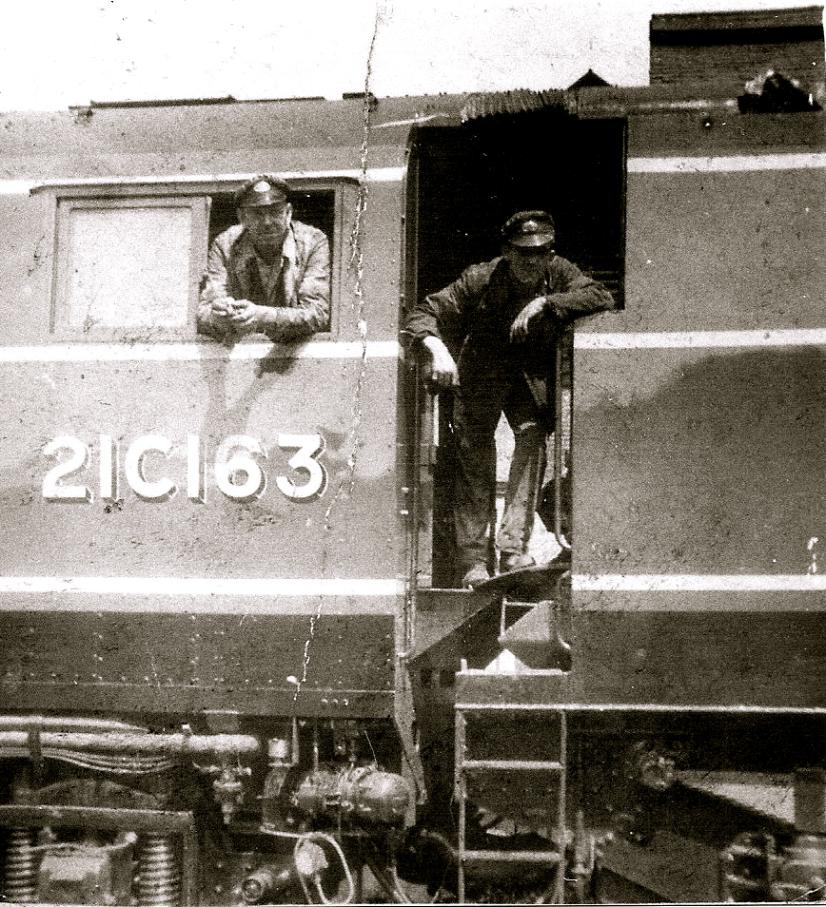
PETER GAMBLING COLLECTION
Driver Fred (Rab) Gambling & Fireman Harry Mitchell
LOCOMOTIVE JOURNAL
STRIKE ISSUE
JULY 1955
BRIGHTON (2)
It is with great pleasure and pride in our hearts that we can report in this special issue of the JOURNAL such a splendid
response by all our Motormen, Drivers, Firemen and Cleaners, members of No.1 and No.2 Branches, to the E.C.’s call May
28th and also to include in this report a tribute from Bro. C. Batchelor, who says:
“Congratulations to Brighton for 100 per cent response to the call of the E.C. for strike action. One member in steam and one
“Non” spoilt the record.
Thanks are due to the Branch Secretaries and Strike Committee for carrying out of their duties so well, also to the N.U.R.
members who came out and thus assisted in getting our grade recognised.
This proves that there is only one Union for footplate staff, that is the A.S.L.E.& F.
The bond between the Electric and Loco depots during the strike should now be maintained in all L.D.C. and social matters.
Keep the good work up brothers!
Yours fraternally, C. Batchelor.”
These remarks by Bro Batchelor make all the work and trouble involved very much worthwhile, to know that ir was so
appreciated. Lets us hope this spirit of brotherhood will long be kept alive through the medium of our branch rooms.
F.W. Musk
Branch Chairman
W. J. CLEAVER - District No.7
During the crisis period I addressed special meetings at Ashford, Brighton Nos. 1 and 2 (twice), Colchester (twice),
Paddington, Slough, Reading Nos. 1 and 2 branches, Hitchin, Southall, Kentish Town, Stratford, Cricklewood,
Clacton, Parkeston Quay, Wimbledon and district, Southend and Shoeburyness Joint, Feltham, Eastbourne, Newhaven,
King's Cross, Gillingham and Didcot. I also addressed the special meetings of the London and Redhill District Councils.
Packed halls were in evidence everywhere and votes of confidence in the General Secretary and the Executive Committee
were in every instance unanimous.
A.S.L.E.F.'s NATIONAL STRIKE OF 1955
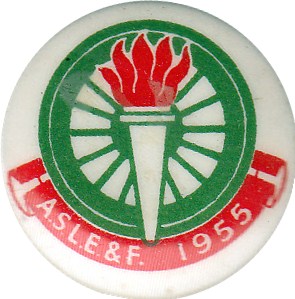
ALAN PENTNEY COLLECTION
The reason for the A.S.L.E.F National Strike of 1955 lay
behind the wage increase by the Transport Commission.
A.S.L.E.F. felt that this offer of between 9% for the lower
Footplate Grades to only 1% for the higher had eroded
differentials between Enginemen and Motormen and other
Railway Grades. After protracted negotiations led to no
agreement being reached the National Strike was called for
from midnight on Saturday May 28th.
The Chairman of British Rail Southern Region Area Board
stated that out of 1000 Motormen employed only 42 had
reported for Duty. The N.U.R. did not support the Strike but very few Enginemen or Motormen were in that union.
At Brighton on Whit Monday only 12 Trains ran all day to
and from London only a fraction of what would normally
been the case on a Bank Holiday.
The Strike lasted for 17 days being called off after The
Transport Commission agreed that there was a case for
higher rewards adding 2 % for the higher grades of
Enginemen and Motormen.
The Strike had been backed by almost 100% of A.S.L.E.F.
Members. On June 29th the very few who had defied the call
to strike were expelled from the union by the Executive
Committee.
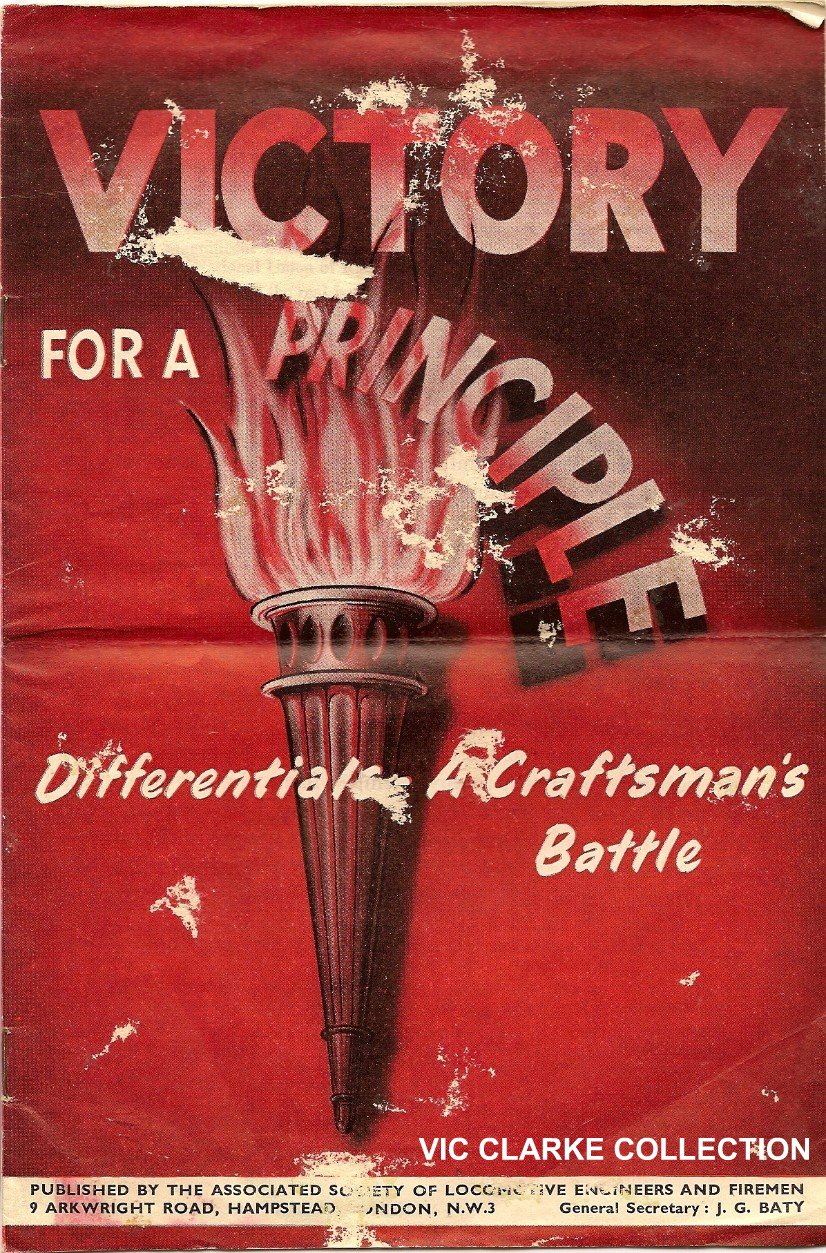
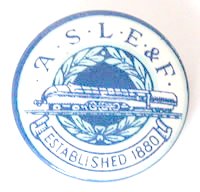
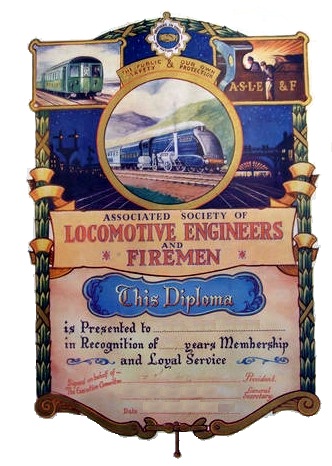
LOCOMOTIVE JOURNAL
BRIGHTON (2)
1955
Once again I have to report that differences have arisen with
the local management at this Depot over their non-observance
of some National and L.D.C. agreements, and a special
meeting of Branch Officials and our L.D.C. was held to deal
with this matter. With efficient guidance of Organiser Bro. A.
Newbegin, it was decided to ask for a consultation between the
District Motive Power Superintendent and L.D.C. to
endeavour to stop the violating of these agreements in future;
we ask members to give more strength to the L.D.C. by seeing
to it that agreements are observed.
On November 20th the Retirement and Social Fund held the
Annual Reunion, and a dinner and social evening was
provided in a very successful way by the Committee. Organiser
A. Newbegin, who attended this function, presented gifts from
the Fund to the retiring members, Bros. T. Gunn, F. Larkin and
A. Staniford; then, with appropriate words to them, he referred
in turn to their length of service and their Society membership,
and the changes and benefits which had been obtained through
the efforts of our Society during their careers on the footplate
and in Motor-man’s cabs. He wished them on behalf of all
retired members a long and happy retirement. Bro. F. Larkin
suitably replied for all three.
F.W. MUSK BRANCH CHAIRMAN
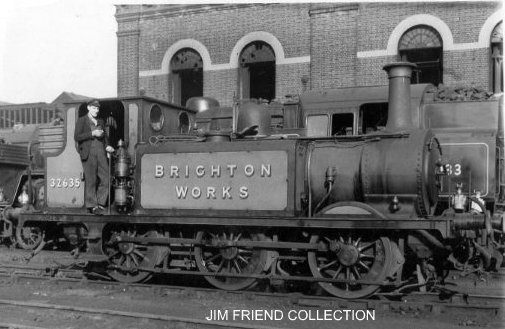
Jim Friend on the "Brighton Works" engine, a Brighton Terrier Class A1x in Brighon Loco
Jim Friend started at Brighton Loco on 16th January 1956 as a Engine Cleaner and progressing to, Fireman and Past Fireman,
in 1963 Jim transferred to Slade Green EMUT Depot to gain his promotion to Driver. In 1965 Jim transferred to Charing
Cross where remained until 20th April 1985, when Jim emigrated to Adelaide, South Australia where he now resides.
LOCOMOTIVE JOURNAL
BRIGHTON (2)
1956
On November 12 a very successful Social Evening was held at the Richmond Hotel, where Bros. C. Cole, A. Routledge*^, W.
Hudson and A.T. Green* were presented with a gift from the Retirement Fund. Organiser W. Cleaver made the presentations
with appropriate words. Let us keep the good work of this fund going. At our December meeting all officers were re-elected for
1956. The present L.D.C. were adopted as the official nominees for 1956. The January meeting was enlivened by the
attendance of Bro. Monty Renshaw (A.A. Delegate), who gave a splendid report on Conference, touching especially on items
affecting motormen and dual men. Several questions were asked and very ably replied to and there was no doubt left in our
minds that the grade of motormen is being brought to the surface to our constitution, and with the coming of increased
electrification over a wider area the maintaining of the position of motorman will have to be seriously considered. So fill the
Branch Room, lads, and let our E.C. know that we are very much alive to those who matters that will assist the front end of the
future – “the motorman.”
F.W. MUSK
BRANCH CHAIRMAN
* Original Brighton No. 2 Branch Member
^ West Worthing Motorman
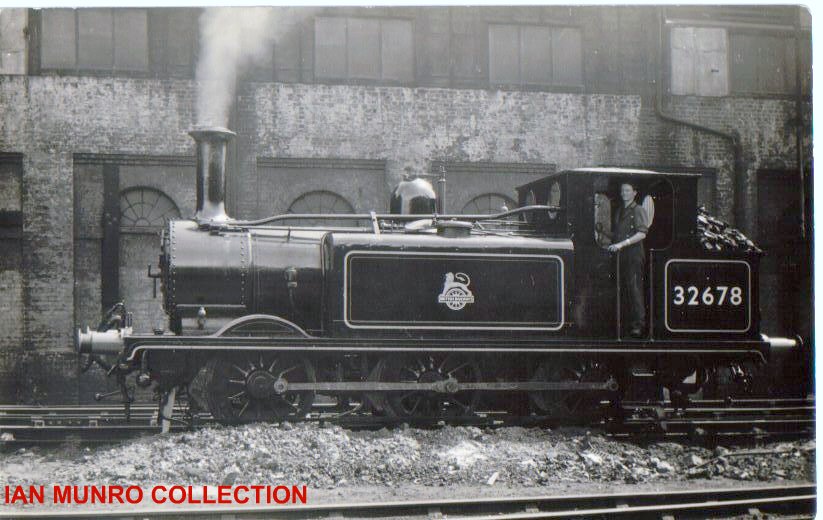
Ian Munro
Outside the Weighbridge in Brighton Loco.
Ian entered the footplate grades on the 14.08.1950 at Brighton and later transferring to Brighton
E.M.U.T. in the early 1970s. On the 22nd July 1974, Ian eventually transferred to West
Worthing to do a mutual change of depots with West Worthing driver Ted Janes. With the
closure of West Worthing in 1995 transferred to Barnham where he remained until his
retirement.
In July 2011 Ian emigrated to Canada.
LOCOMOTIVE JOURNAL
JANUARY 1957
BRIGHTON (2)
PAGE 33
Steady attendance at meetings has been maintain by the “regulars” who deserve all the praise for keeping the Society
interests on top, and letting the “lobby critics” see that we are a live branch who intend to give every assistance to our L.D.C.
in upholding our agreements against the strong opposition we find all too frequently from the other side of the table. The
interpretation of some conditions of service from that quarter calls forth much criticism and hard feeling from the men when
they find themselves frustrated by a management side who seem to try by all means to make the accepted conditions and
agreements read only to suit their requirements. We should like a much better attendance and an increase in confidence and
support for our L.D.C.
Our Annual Retirement and Social Fund Presentation was held on November 17 and a jolly evening was enjoyed by all. Bro.
A. Taylor made presentations to eight of our retiring comrades from the footplate and the Motorman’s cab. This was the first
year that the Steam and Electric Retirement Funds had joined forces which we hope will continue.
F.W. Musk
Branch Chairman
EXTRACTED FROM
LOCOMOTIVE JOURNAL
OCTOBER 1957
W.J. CLEAVER
DISTRICT No.7
During the period since my last Journal notes Coroners’ Inquests have had my attention at Reading St Pancras and Woking,
and Ministry of Transport Inquiries at Old Oak Common goods, Clapham Junction (two inquiries), Charing Cross (two
inquiries), Pitsea, Stonebridge Park, Westbourne Grove, Parkeston Quay, and Haywards Heath.
At Haywards Heath the inquiry was held to investigate the circumstances responsible for a serious accident to one of our
young Fireman members. Whilst working a goods train the Fireman injector “flew off” and after several futile attempts to re-
start it, it appears that our member concluded the men who prepared the engine had failed to fill the tank. Without indicating
his intention to the Driver, who at this stage was looking out for signals, the Fireman apparently climbed on to the tender in
order to lift the tank lid and, whilst so doing was struck by an overbridge ad sustained severe head injuries. This is an
unfortunate accident that should not have taken place. Rule 126, Clause 7, reminds enginemen of the dangers of leaving the
footplate whilst the engine is in motion, and, if the circumstances are such that it is absolutely necessary for such action, the
rule provides for certain arrangements by which that operation with reasonable safety.
LOCOMOTIVE JOURNAL
FEBRUARY 1958
page 65
BRIGHTON (2)
Attendance at meetings has slightly improved and it is heartening to see younger fraternity taking part in activities. Lively
discussions on matters affecting our livelihood often take place and we find 2 1/2 hours pass all too soon. See that we keep
this up, Bros., and do your best to get some of the “slackers” to attend these meetings.
We had the pleasure of a visit, on August 8, by the 1957 A.A.D delegate, Bro. P. Collens. Following his very interesting report
members present found much satisfaction when their questions were very ably answered by him.
I had a very pleasing surprise at the December meeting when I was presented by our Secretary, Bro. C. Stoner, with the
Society’s Pen and Pencil Set having completed 5 years in the Chair. In expressing my thanks I remarked that despite the many
ups and downs of opinion I would still do my best to keep an unbiased mind and assist in the upholding of our Society’s
policy and maintaining of our National Conditions of Service. In closing this report I wish to thank the L.D.C. for the hard
work they perform against difficult odds and wish them, with all my other colleagues, a very Prosperous New Year.
F. W. MUSK
BRANCH CHAIRMAN
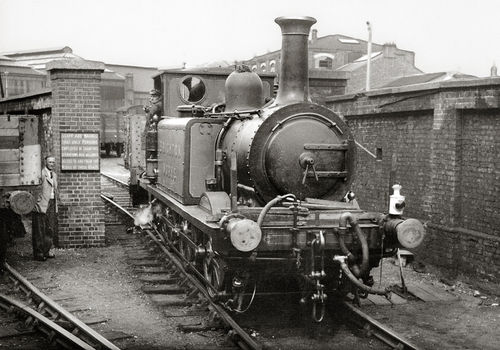
PHOTOGRAPHER UNKNOWN
LOCOMOTIVE JOURNAL
FEBRUARY 1958
BARNSTAPLE
(Extracted & adapted)
PAGE 61
The chief officers remain although it was necessary to elect a vice chairman to replace Bro. Eric Wellington who has
transferred to Brighton. We wish him every success for the future.
THE BRIGHTON BRANCH OF A.S.L.E.&F. WEBSITE.
HAS NOW BEEN MOVED TO A NEW SITE CALLED
IGNITING THE FLAMING OF UNITY
https://ignitingtheflameofunity.yolasite.com/
PLEASE CLICK ON THE IMAGE BELOW
TO TRANSFER TO THIS NEW SITE
CLICK ON THE ABOVE IMAGE TO TAKE YOU
TO THE NEW UPDATED COMBINED AND WEBSITE
IGNITING THE FLAME OF UNITY WEBSITE
https://ignitingtheflameofunity.yolasite.com/
THIS WEBSITE COMBINES THE FOLLOWING WEBSITES
THE BRIGHTON A.S.L.E.&F., THE BRIGHTON MOTIVE POWER DEPOTS
& THE SUSSEX MOTIVE POWER WEBSITES
WHICH EXPLAINS THE EVOLUTION OF THE FOOTPLATE GRADES AND THE
HISTORY OF THEIR TRADE UNIONS AND THE STRUGGLES TO IMPROVE
THEIR WORKING LIVES
CLICK ON THE ABOVE IMAGE TO TAKE YOU
TO THE NEW UPDATED COMBINED AND WEBSITE
IGNITING THE FLAME OF UNITY WEBSITE
https://ignitingtheflameofunity.yolasite.com/
THIS WEBSITE COMBINES THE FOLLOWING WEBSITES
THE BRIGHTON A.S.L.E.&F., THE BRIGHTON MOTIVE POWER DEPOTS
& THE SUSSEX MOTIVE POWER WEBSITES
WHICH EXPLAINS THE EVOLUTION OF THE FOOTPLATE GRADES AND THE
HISTORY OF THEIR TRADE UNIONS AND THE STRUGGLES TO IMPROVE
THEIR WORKING LIVES
LOCOMOTIVE JOURNAL
APRIL 1959
PLYMOUTH FRIARY
(Extracted & adapted)
PAGE 131
The March meeting of our Branch bruh a special occasion: the members of the Branch gathering to pay a tribute to our
retiring member, Bro. Ern Binstead (Seniority Date14.03.19).
“Ern” came to us about 20 years ago from the Brighton railway, and at all times proved himself a good Trade Unionist. it was
a great surprise to most of us to learn that Ern had served in the 1914 - 18 War, and, what is more, that he had received the
M.M. for gallantry on the Somme.
He was presented with a wristlet watch, suitably inscribed, from the men at the depot.

